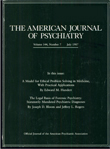Three-Year Trials of Personal Therapy Among Schizophrenic Patients Living With or Independent of Family, I: Description of Study and Effects on Relapse Rates
Abstract
OBJECTIVE: The study of individual psychotherapeutic approaches to the treatment of schizophrenia has yielded equivocal findings, partly because of methodologic problems. Further, the ability of psychosocial treatments to prevent psychotic relapse appears to lessen over time. The authors' goal was to develop and test a demonstrably effective individual therapy for schizophrenia. METHOD: Using a study design that addressed previous methodologic issues, the authors evaluated personal therapy specifically designed to forestall late relapse in patients with schizophrenia. They evaluated the effectiveness of personal therapy over a period of 3 years after hospital discharge among 151 patients with schizophrenia or schizoaffective disorder diagnosed according to Research Diagnostic Criteria. The patients were randomly assigned to receive either personal therapy or contrasting therapies in one of two concurrent trials. One trial studied patients who were living with family (N=97); the other studied patients who were living independent of family (N=54). RESULTS: All of the patients had extensive psychiatric histories, but only 44 (29%) experienced recurrent psychotic episodes over the 3-year study period, and only 27 (18%) prematurely terminated the study; most of those who left the study were in the no-personal-therapy conditions. Among patients living with family, personal therapy was more effective than family and supportive therapies in preventing psychotic and affective relapse as well as noncompliance. However, among patients living independent of family, those who received personal therapy had significantly more psychotic decompensations than did those who received supportive therapy. CONCLUSIONS: Personal therapy had a positive effect on adverse outcomes among patients who lived with family. However, personal therapy increased the rate of psychotic relapse for patients living independent of family. The application of personal therapy might best be delayed until patients have achieved symptom and residential stability. (Am J Psychiatry 1997; 154:1504–1513)



